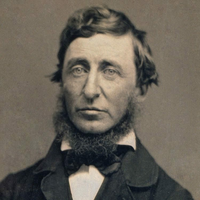Poetry
A true poem is distinguished, not so much by a felicitous expression or any thought it suggests, as by the atmosphere which surrounds it. Most have beauty of outline merely, and are striking as the form and bearing of a stranger, but true verses come toward us indistinctly, as the very kernel of all friendliness, and envelope us in their spirit and fragrance. Much of our poetry has the very best manners, but no character. It is only an unusual precision and elasticity of speech, as if its author had taken, not an intoxicating draught, but an electuary. It has the distinct outline of sculpture, and chronicles an early hour. Under the influence of passion all men speak thus distinctly, but wrath is not always divine.
There are two classes of men called poets. The one cultivates life, the other art; one seeks food for nutriment, the other for flavor; one satisfies hunger, the other gratifies the palate. There are two kinds of writing, both great and rare; one that of genius, or the inspired, the other of intellect and taste, in the intervals of inspiration. The former is above criticism, always correct, giving the law to criticism. It vibrates and pulsates with life forever. It is sacred, and to be read with reverence, as the works of nature are studied. There are few instances of a sustained style of this kind; perhaps every man has spoken words, but the speaker is then careless of the record. Such a style removes us out of personal relations with its author, we do not take his words on our lips, but his sense into our hearts. It is the stream of inspiration, which bubbles out, now here, now there, now in this man, now in that. It matters not through what ice-crystals it is seen, now a fountain, now the ocean stream running under ground. It is in Shakespeare, Alpheus, in Burns, Arethuse; but ever the same. The other is self-possessed and wise. It is reverent of genius, and greedy of inspiration. It is conscious in the highest and the least degree. It consists with the most perfect command of the faculties. It dwells in a repose as of the desert, and objects are as distinct in it as oases or palms in the horizon of sand. The train of thought moves with subdued and measured step like a caravan. But the pen is only an instrument in its hand, and not instinct with life, like a longer arm. It leaves a thin varnish or glaze over all its work. The works of Goethe furnish remarkable instances of the latter.
There is no just and serene criticism as yet. Our taste is too delicate and particular. It says nay to the poet’s work, but never yea to his hope. It invites him to adorn his deformities, and not to caste them off by expansion, as the tree its bark. We are a people who live in a bright light, in houses of pearl and porcelain, and drink only light wines, whose teeth are easily set on edge by the least natural sour. If we had been consulted, the backbone of the earth would have been made, not of granite, but of Bristol spar. A modern author would have died in infancy in a ruder age. But the poet is something more than a scald, “a smoother and polisher of language”; he is a Cincinnatus in literature, and occupies no west end of the world, but, like the sun, indifferently selects his rhymes, and with a liberal taste weaves into his verse the planet and the stubble.
In these old books the stucco has long since crumbled away, and we read what was sculptured in the granite. They are rude and massive in their proportions, rather than smooth and delicate in their finish. The workers in stone polish only their chimney ornaments, but their pyramids are roughly done. There is a soberness in a rough aspect, as of unhewn granite, which addresses a depth in us, but a polished surface hits only the ball of the eye. The true finish is the work of time and the use to which a thing is put. The elements are still polishing the pyramids. Art may varnish and gild, but it can do no more. A work of genius is rough-hewn from the first, because it anticipates the lapse of time, and has an ingrained polish, which stil appears when fragments are broken off, an essential quality of its substance. Its beauty is at the same time its strength, and it breaks with a lustre. The great poem must have the stamp of greatness as well as its essence. The reader easily goes within the shallowest contemporary poetry, and informs it with all the life and promise of the day, as the pilgrim goes within the temple, and hears the faintest strains of the worshippers; but it will have to speak to posterity, traversing these deserts through the ruins of its outmost walls, by the grandeur and beauty of its proportions.



